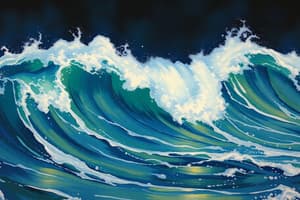Podcast
Questions and Answers
What is the relationship between the phase velocity and group velocity of a wave?
What is the relationship between the phase velocity and group velocity of a wave?
In general, the phase velocity is not equal to the group velocity. They can be different depending on the dispersion relation of the medium.
Explain the concept of impedance matching in the context of wave reflection and transmission at a boundary.
Explain the concept of impedance matching in the context of wave reflection and transmission at a boundary.
Impedance matching is the technique used to minimize wave reflection at a boundary by adjusting the impedance of the two media to be equal.
What are Eigen frequencies in the context of standing waves on a string?
What are Eigen frequencies in the context of standing waves on a string?
Eigen frequencies are the frequencies at which standing wave patterns can be established on a string with fixed boundary conditions.
How does the loudness of sound relate to the intensity of sound waves?
How does the loudness of sound relate to the intensity of sound waves?
Describe how superposition of waves leads to the formation of standing waves.
Describe how superposition of waves leads to the formation of standing waves.
Flashcards are hidden until you start studying
Study Notes
Phase Velocity vs. Group Velocity
- Phase Velocity is the speed at which a particular phase of the wave (e.g., crest) travels through space.
- Group Velocity refers to the speed at which the overall envelope shape of wave groups (or wave packets) travels, often associated with the energy of the waves.
- Relationship: The group velocity can differ from the phase velocity, especially in dispersive media where waves of different frequencies travel at different speeds.
Impedance Matching
- Impedance matching is the process of making the impedance of two media equal at their interface to maximize power transfer and minimize reflection.
- At a boundary, if the impedances are matched, most of the wave is transmitted with minimal reflection.
- Important in various applications, such as audio systems, antennas, and optical fibers, to ensure efficient signal propagation.
Eigen Frequencies of Standing Waves
- Eigen frequencies are the natural frequencies at which a standing wave can form on a string fixed at both ends.
- Each eigen frequency corresponds to a specific mode of vibration, determined by the length of the string and the tension within it.
- The fundamental frequency is the lowest eigen frequency, and higher frequencies are harmonics, which are integer multiples of the fundamental.
Loudness and Sound Intensity
- Loudness is the perceptual response to the intensity of sound, reflecting how we perceive sound's strength or volume.
- The intensity of sound waves is measured as power per unit area and is directly proportional to the square of the amplitude of the wave.
- Higher intensity results in greater loudness, while lower intensity leads to softer sounds.
Superposition and Standing Waves
- Superposition occurs when two or more waves overlap in space, leading to a combined effect at each point.
- When waves with the same frequency and amplitude traveling in opposite directions interact, they can form standing waves.
- Standing waves are characterized by nodes (points of no motion) and antinodes (points of maximum motion), resulting from constructive and destructive interference.
Studying That Suits You
Use AI to generate personalized quizzes and flashcards to suit your learning preferences.




